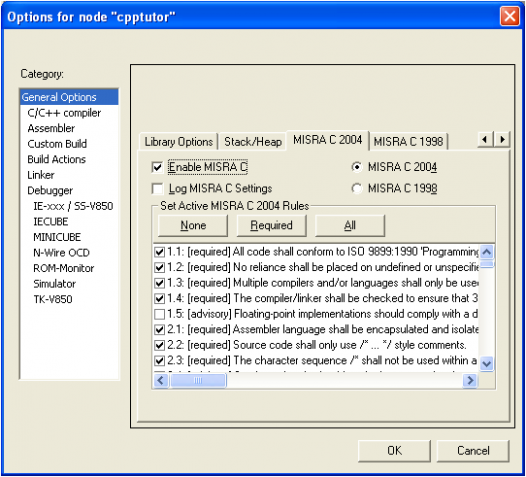|
|
|
|
|
MISRA Checking - IAR Systems
The MISRA C checker is completely integrated with IAR C/C++ Compiler. From IAR Embedded Workbench, you can control which MISRA C rules are checked; the settings will be used for both the compiler and the linker.
The implementation of the MISRA C rules does not affect code generation, and has no significant effect on the performance of IAR Embedded Workbench. The compiler and linker only generate error messages, they do not actually prevent you from breaking the rules you are checking for. You can enable or disable individual rules for the entire project or at file level. A log is produced at compile and link time, and displayed in the Build Message window of the IAR Embedded Workbench IDE. This log can be saved to a file, as described in the IAR Embedded Workbench User Guide.
Note: MISRA C checker is included free-of-charge in standard editions of IAR Embedded Workbench products. Currently MISRA-C:2004 support is available in target V850, 78K and AVR32. MISRA support on the other targets will be implemented with new releases.

A message is generated for every deviation from a required or advisory rule, unless you have disabled it. Each message contains a reference to the MISRA C rule deviated from.The format of the reference is as in the following error message:
Error[Pm088]: pointer arithmetics should not be used (MISRA C 2004 rule 17.4)
Note: The numbering of the messages does not match the rule numbering.
For each file being checked with MISRA C enabled, you can generate a full report ontaining a list of:
MISRA C compliance
To claim compliance with the MISRA C guidelines for your product, you must demonstrate that:
-
A compliance matrix has been completed demonstrating how each rule is enforced.
-
All C code in the product is compliant with the MISRA C rules or subject to documented deviations.
-
A list of all instances where rules are not being followed is maintained, and for each instance there is an appropriately signed-off documented deviation.
-
You have taken appropriate measures in the areas of training, style guide, compiler selection and validation, checking tool validation, metrics, and test coverage, as described in section 4.2 of Guidelines for the Use of the C Language in Critical Systems.
For universal MISSA-C:1998, MISRA-C:2004 and MISRA-C++:2008 compliance testers, please contact Gerard Fianen at INDES-IDS BV.
|
|
|
|
















